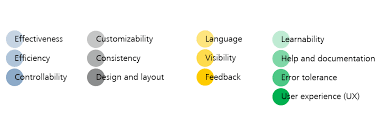Exploring the Dynamic World of a Java Developer
The Role of a Java Developer in Today’s Technology Landscape
Java developers play a crucial role in the ever-evolving world of technology. With the widespread use of Java in various applications and platforms, the demand for skilled Java developers continues to rise.
Responsibilities of a Java Developer
A Java developer is responsible for designing, developing, and maintaining Java-based applications. They work closely with project managers, software architects, and other team members to create efficient and scalable solutions.
Some key responsibilities of a Java developer include:
- Writing clean and efficient code using Java programming language
- Testing and debugging applications to ensure they meet quality standards
- Collaborating with cross-functional teams to deliver projects on time
- Keeping up-to-date with the latest trends and technologies in the Java ecosystem
- Optimizing application performance for maximum speed and scalability
Skills Required for Java Developers
To excel as a Java developer, one must possess a combination of technical skills and soft skills. Some essential skills for Java developers include:
- Proficiency in core Java programming concepts
- Familiarity with frameworks like Spring, Hibernate, or Struts
- Knowledge of database management systems such as MySQL or Oracle
- Problem-solving abilities and attention to detail
- Strong communication skills for effective collaboration within teams
Career Opportunities for Java Developers
The demand for skilled Java developers is high across various industries, including finance, healthcare, e-commerce, and more. With experience and expertise in Java development, professionals can explore roles such as:
- Java Software Engineer
- Java Web Developer
- Java Application Architect
In conclusion, being a Java developer offers exciting opportunities to work on diverse projects and contribute to the advancement of technology. With continuous learning and dedication to honing their skills, Java developers can build rewarding careers in the dynamic field of software development.
9 Essential Tips for Becoming a Better Java Developer
- Keep learning and improving your Java skills regularly.
- Stay updated with the latest Java technologies and trends.
- Practice coding regularly to enhance your problem-solving abilities.
- Collaborate with other developers to learn from their experiences and perspectives.
- Write clean and efficient code for better maintainability and performance.
- Utilize debugging tools effectively to troubleshoot issues in your Java applications.
- Document your code properly for easier understanding by yourself and others.
- Be open to feedback and continuously seek ways to improve your coding practices.
- Explore different frameworks and libraries in the Java ecosystem to broaden your skill set.
Keep learning and improving your Java skills regularly.
To excel as a Java developer, it is essential to prioritize continuous learning and skill improvement. Keeping up-to-date with the latest advancements in Java programming and regularly honing your skills not only enhances your expertise but also ensures that you stay competitive in the ever-evolving tech industry. By dedicating time to learning new concepts, exploring different frameworks, and staying informed about industry trends, you can strengthen your capabilities as a Java developer and pave the way for a successful career in software development.
Stay updated with the latest Java technologies and trends.
Staying updated with the latest Java technologies and trends is essential for Java developers to remain competitive and relevant in the ever-evolving tech industry. By keeping abreast of new features, tools, and best practices in Java development, developers can enhance their skills, improve their efficiency, and deliver cutting-edge solutions to meet the demands of modern software development projects. Continuous learning and adaptation to emerging trends not only broaden a developer’s knowledge but also pave the way for innovation and success in their Java development career.
Practice coding regularly to enhance your problem-solving abilities.
To enhance your problem-solving abilities as a Java developer, it is crucial to practice coding regularly. By consistently engaging in coding exercises and challenges, you can sharpen your skills, improve your understanding of Java programming concepts, and become more adept at tackling complex problems efficiently. Regular practice not only reinforces your knowledge but also boosts your confidence in handling various coding tasks, ultimately making you a more proficient and effective Java developer.
Collaborate with other developers to learn from their experiences and perspectives.
Collaborating with other developers is a valuable tip for Java developers looking to enhance their skills and broaden their knowledge. By working closely with peers, developers can gain insights from different experiences and perspectives, leading to a deeper understanding of Java programming concepts and best practices. This collaborative approach not only fosters a sense of teamwork but also promotes continuous learning and growth within the development community.
Write clean and efficient code for better maintainability and performance.
Writing clean and efficient code is a fundamental tip for Java developers to enhance maintainability and performance of their applications. By following best practices and adhering to coding standards, developers can ensure that their code is easy to understand, modify, and debug. Clean code not only improves collaboration within development teams but also contributes to optimized performance, resulting in faster execution and scalability of the application. Embracing the principle of writing clean and efficient code empowers Java developers to deliver high-quality software solutions that meet the evolving needs of modern technology landscapes.
Utilize debugging tools effectively to troubleshoot issues in your Java applications.
To enhance your proficiency as a Java developer, it is essential to utilize debugging tools effectively when troubleshooting issues in your Java applications. Debugging tools such as breakpoints, watchpoints, and stack traces can help you identify and resolve errors efficiently, ensuring the smooth functioning of your applications. By mastering these tools and techniques, you can streamline the debugging process and improve the overall quality of your Java code.
Document your code properly for easier understanding by yourself and others.
Properly documenting your code is a crucial tip for Java developers to enhance understanding and maintainability. Clear and concise documentation not only helps you navigate your own code more efficiently but also enables other developers to grasp the logic and functionality of your work. By documenting your code effectively, you contribute to a smoother collaboration process and ensure that future modifications or troubleshooting tasks can be carried out with ease.
Be open to feedback and continuously seek ways to improve your coding practices.
Being open to feedback and continually seeking ways to enhance coding practices is essential for Java developers to grow and excel in their careers. Embracing constructive criticism and actively seeking opportunities for improvement not only helps developers refine their skills but also fosters a culture of continuous learning and innovation within the development community. By remaining receptive to feedback and being proactive in refining coding practices, Java developers can stay ahead of industry trends and deliver high-quality solutions that meet the evolving needs of the tech landscape.
Explore different frameworks and libraries in the Java ecosystem to broaden your skill set.
To enhance your capabilities as a Java developer, it is highly recommended to explore various frameworks and libraries within the Java ecosystem. By delving into different tools and resources, you can expand your skill set and gain valuable insights into diverse approaches to software development. This exploration not only enriches your knowledge but also equips you with the flexibility to adapt to different project requirements and industry trends, making you a more versatile and proficient Java developer.





